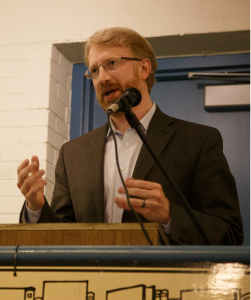Brian Southwell, UNC at Chapel Hill – Social Media Disparity
The manner by which information travels on social media tends to corrode it’s accuracy.
Dr. Brian Southwell, research professor of mass communication and health behavior at the University of North Carolina, discusses the disparity of shared information on the internet.
Dr. Brian Southwell is Director of the Science in the Public Sphere Program in the Center for Communication Science at RTI International. He also is a Research Professor (of Mass Communication) and Adjunct Associate Professor (of Health Behavior) at the University of North Carolina at Chapel Hill. In addition, Dr. Southwell is an Adjunct Professor with Duke University’s Energy Initiative, a university-wide effort to promote innovation in energy consumption and delivery.
Before moving to North Carolina, Southwell served for almost a decade at the University of Minnesota, most recently as Associate Professor and Director of Graduate Studies in the School of Journalism and Mass Communication with an adjunct appointment in the School of Public Health. Additionally, he has worked for a variety of nonprofit and government organizations, including the Centers for Disease Control and Prevention (CDC) and Ogilvy Public Relations.
Southwell has conducted research on topics such as campaign measurement and evaluation, with emphasis on exposure measurement, the intersection of interpersonal communication, social networks, and mass communication, and the role of aging and memory. His research also has spanned a number of behaviors and audiences, including the Office of National Drug Control Policy’s antidrug efforts with adolescents, CDC’s cancer prevention and screening promotion efforts, the National Science Foundation’s efforts to reach local television news viewers, various state-level campaigns and projects for the Food and Drug Administration. The National Institutes of Health and other sources also have funded his work. Dr. Southwell’s contributions appear in more than 70 journal articles and chapters, in publications such as Social Science and Medicine and Communication Research. In 2013, Johns Hopkins University Press released his Social Networks and Popular Understanding of Science and Health, which has been a widely reviewed book. He has served as senior editor for Health Communication and as a member of the editorial board of Public Opinion Quarterly and seven other editorial boards. He co-edited a special issue of Communication Theory in 2009 on conversations and campaigns and is co-editing a forthcoming special issue of the Journal of Communication on misinformation.
Southwell’s 2002 dissertation, completed at the University of Pennsylvania, was awarded the Health Communication Dissertation of the Year jointly by the International Communication Association and the National Communication Association. In 2006, he was awarded the Arthur “Red” Motley Exemplary Teaching Award at the University of Minnesota. In 2011, he won RTI International’s President’s Award. In 2012, the National Communication Association’s Health Communication division recognized him with the Distinguished Article Award for a 2007 paper co-authored with Dr. Marco Yzer.
Social Media Disparity
![]()
Pundits talk about the 21st century as the full flowering of the information age. Central to such thinking is the grand promise of peer-to-peer information sharing. Instead of being limited to a one-to-many broadcast era in which a few broadcasters reach large audiences, information also can be expressed from many to many 24 hours a day. Many people particularly celebrate the possibilities of social media and other new peer-to-peer connection technologies to teach people in the 21st century.
Although there are new possibilities in our midst, however, we also need to be thoughtful in moving forward based on empirical evidence.
Rather than encouraging equity in what we all know and think about scientific discoveries, household consumer tips, or health recommendations, reliance on social networks to spread information may be a recipe for inequity.
An increasing body of research suggests people are not equal in their tendency to share information with others around them. Some of those differences represent disparity in that information sharing is constrained unjustly by factors outside of a person’s control.
Consider work that I conducted with colleagues a few years ago to leverage peer networks for referral to a free mammography program. Only a small group of women actually did almost all of the referring. A few people referred many; most referred none.
Information also doesn’t all spread equally. Many of us are familiar with the ubiquity of furry kitten pictures forwarded online. Similarly, researchers have found emotionally evocative and sensational material travels further and more frequently than does other material.
All of this matters as we increasingly see an information landscape shaped by what is shared. Everyone does not play an equal role in what is shared and some messages are easier to spread than others. Addressing those inequities will require continued research. Social media are abundant now, but do not eliminate our old human tendencies and constraints.



